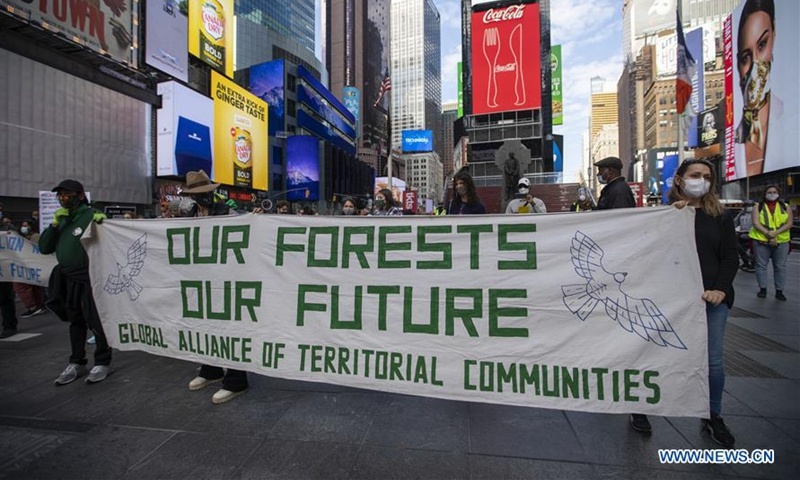Taking better care of nature could absorb many more climate-changing emissions - but will only work if big companies simultaneously slash their own emissions and focus on boosting biodiversity, not just planting trees, scientists warned.

People take part in a climate change protest in Times Square in New York, the United States, on Sunday. Photo: Xinhua
"It's vitally important to understand this potential can only be achieved with rapid and aggressive decarbonization," said Nathalie Seddon, who directs the Nature-Based Solutions Initiative at Britain's University of Oxford.
A broad range of companies, including some fossil fuel firms, are now promoting and adopting tree planting and other "nature-based solutions" as a smart and easy-to-grasp way to tackle the twin crises of climate change and biodiversity loss.
More than 560 companies on Monday urged governments to put in place stronger policies to protect nature and fight climate change, and guide business efforts toward those goals.
Many of the companies, part of the Business for Nature coalition, said at New York Climate Week events that they were pressing ahead with their own green actions, from adopting clean energy to offsetting their carbon emissions by adding trees. But biodiversity and climate experts warned that in the corporate rush to cut emissions to net zero, too many nature projects are proving ineffective or even counter-productive.
They called for tighter standards to ensure investment goes to what actually works. In particular, a surge of new tree-planting initiatives will be "hugely problematic" if it drives creation of commercial tree plantations rather than rejuvenation of natural forests, wetlands and other ecosystems, Seddon told an online event.
"People like trees," the biodiversity scientist said. "You can physically plant them in the ground... There's a romance around trees." But just establishing plantations "isn't a climate solution," she said, not least because the trees are often intended to be harvested and used, which can release the carbon they store.
Worsening forest fires, pest plagues and simple neglect also can mean plantations do not last long enough to do the job promised, she and others said.
Seddon called for green investments that focus on restoring land to "what was there before human interventions" and are done with the approval and guidance of local and indigenous people.
The planet's forests and other ecosystems today absorb almost 30 percent of climate-changing emissions, with oceans taking in another 24 percent - levels that could grow if natural systems are restored and expanded, she added.
Richard Black, of the UK-based nonprofit Energy and Climate Intelligence Unit, said more than half of the 30 biggest companies with net-zero emissions pledges were relying to some extent on nature-based solutions to meet them.
Only a few have made clear how strong that reliance is, he noted.
Seddon said judging how many were adhering to best practices and science was very difficult. Failing to slash emissions would undermine both carbon offsetting efforts and the natural systems that act as planetary life support, Seddon warned.


